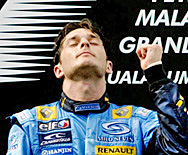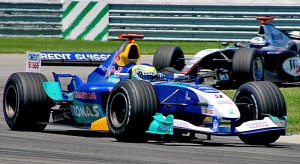Difference between revisions of "Giancarlo Fisichella"
m |
m |
||
| Line 704: | Line 704: | ||
{{Formula One teams}} | {{Formula One teams}} | ||
| − | |||
Latest revision as of 17:10, 26 September 2009
| Giancarlo Fisichella | |
|---|---|
| Caption | Fisichella on the podium following his victory at the 2006 Malaysian Grand Prix. |
| Nationality | |
| Car number | 21 |
| Team | Force India |
| Team for 2007 | Renault |
| Races | 197 (195 starts) |
| Championships | 0 |
| Wins | 3 |
| Podiums | 18 |
| Points | 267 |
| Poles | 3 |
| Fastest laps | 2 |
| First race | 1996 Australian Grand Prix |
| First win | 2003 Brazilian Grand Prix |
| Last win | 2006 Malaysian Grand Prix |
| Last race | 2008 Australian Grand Prix |
| Last season | 2007 |
| Last position | 8th (21 pts) |
Giancarlo Fisichella (born January 14, 1973 in Rome, Italy), also known as Fisico or Fisi, is an Italian racing driver. He has driven in Formula One for Renault Sauber, Jordan, Benetton and Minardi. On 10 January 2008 he was confirmed as driver for the new Force India Team.
Fisichella has won three races in his career to date, the first of which was at the chaotic 2003 Brazilian Grand Prix, a race abandoned for safety reasons with 15 laps remaining. After much confusion regarding rules and technicalities (which lasted for several days) Fisichella was eventually declared the winner in the following week, and collected his trophy in an unorthodox ceremony at the following race. Fisichella has endured mixed fortunes at his current team, Renault. He was brought in to the team to replace fellow Italian Jarno Trulli, and won his first race with the team in Australia in 2005. However, after that race it was his team-mate, the Spanish driver Fernando Alonso, that would win the greater share of races for Renault. Although highly rated as a driver, Fisichella was unable to keep pace with eventual champion Alonso, managing just one further race win since his debut. Outside of driving, he runs his own GP2 team, FMS International.
Fisichella is engaged to Luna and they have two children, Carlotta and Christopher.
Early career
Like most current Formula One drivers, he began kart racing as a youngster. In 1992, he competed in the Italian Formula Three series, racing for the RC Motorsport team. He finished runner up in 1993, and in 1994 he won the championship, following race victories in Monaco and Macau. He left open-wheel racing briefly in 1995, driving for Alfa Romeo in the International Touring Car Championship series.
Formula One
1996 Minardi
In 1996, he made the move to Formula One, making his debut for the Minardi team. However he did not complete the full season since Minardi required a driver who could bring funding to the team, and replaced Fisichella with Giovanni Lavaggi.
1997 Jordan
For 1997 he made the move to Eddie Jordan's eponymous team, where he drove alongside former F1 champion Michael Schumacher's brother Ralf, himself a former Formula Nippon champion. Fisichella gained his first podium finish at the 1997 Canadian Grand Prix, and went on to finish higher in the points standings than his team-mate. At Hockenheim a victory looked to be within reach for Fisichella, but a puncture and the performance of an on-form Gerhard Berger denied him the win. Fisichella was able to show his talent again at the rain-soaked Belgian Grand Prix in which he finished a commendable second behind Michael Schumacher. Following this race, the Benetton team signed him for 1998.
1998 - 2001 Benetton
However, the timing of this move was unfortunate. Following Renault's withdrawal from Formula One, Benetton would contest the 1998 season without "works" (factory-supplied) engines, instead using rebranded development versions of 1997 Renault engines. Despite not having the latest engines, Fisichella still managed second places at Montreal and Monaco, even being in contention for a victory in Canada until gearbox problems slowed him down. In Austria, Fisichella scored his first pole position, although an on-track clash with Jean Alesi during the race cost him any chance of a good result. He was then able to add only two more points to his total in the second half of the year as Benetton lost ground on their competition.
1999 proved to be a similarly inconsistent season for Giancarlo Fisichella. He did score some podium finishes, and again came close to a victory in the European Grand Prix, until he crashed out of the lead. This would prove to be his best chance of a victory for the next few seasons.
Fisichella's season was to follow a similar pattern in 2000. He again gained some surprise podium finishes early in the year, but Benetton's now unfortunately traditional poor second half of the season meant that he failed to score any more points. Since joining Benetton, Fisichella had comprehensively outperformed his Austrian team-mate Alexander Wurz, who would then leave the team to make way for British rookie Jenson Button in 2001. Renault had purchased the Benetton team by the start of the 2001 season, but their investment was too late to enable much progress with Benetton's uncompetitive 2001 car, and as a result, Fisichella was battling for much of the season with teams such as Minardi and Prost. However, the efforts of technical director Mike Gascoyne and his staff did result in improvements over the year, culminating in a 4-5 finish at the German Grand Prix and a third place finish for Fischella at the Belgian race. Despite Fisichella gaining the team's best results that season and consistently outperforming Button, he left the team to rejoin Jordan for 2002.
2002 - 2003 Jordan
Fisichella managed to score just seven points for 2002, although the Jordan-Honda car of that year was never truly competitive. After Honda withdrew their engine supply, Jordan switched to Ford engines for the 2003 season, but the team were still unable to compete with the top teams on the grid. Despite this lack of performance, Fisichella won his first race at the Brazilian Grand Prix.
Battling with McLaren's Kimi Räikkönen amidst heavy rain and numerous crashes, Fisichella took the race lead on lap 53, soon before the race was red-flagged. However, he was demoted to second place on the podium, because (per regulations) Räikkönen was the race leader two laps prior to the red flag. Several days later, though, the FIA determined that Fisichella had already begun his 56th lap before the red flag, meaning that he, and not Räikkönen, had been leading the race two laps before its premature end, awarding the Italian his first F1 victory. For nearly two years (i.e. until his win in the 2005 Australian Grand Prix), Fisichella was the only F1 driver to have won a race without having stood atop the podium. He collected the winner's trophy at the next race at Imola. Fisichella's only other points finish of 2003 was to be a seventh place at Indianapolis.
2004 Sauber
Unhappy at the Jordan team's performance, Fisichella moved to Sauber in 2004 in the hope of greater results, and of using the team as a way of gaining access to, and a drive for, 2003 World Champions Ferrari, who supplied re-badged engines to the Sauber team. Fisichella drove well all year, comfortably outpacing team mate Felipe Massa for much of the season.
2005 - 2007 Renault
His strong performances prompted former Benetton-Renault team boss Flavio Briatore to re-sign him for the 2005 season as partner to the young Spanish driver Fernando Alonso. A win at in the season's opening race at Melbourne signalled the Formula One breakthrough that commentators had been predicting, but it proved to be something of a false dawn. A run of poor luck saw Fisichella fall behind his team mate in the championship standings, and at times the pair were achieving noticeably different lap times with the same equipment. It appeared that Fisichella simply did not have the pace to match Alonso.

The difference in pace between Fisichella and Alonso was noticeable, and while Alonso's metronomic consistency helped him win the 2005 championship, Fisichella's lack thereof was to cost him points finished. He was overtaken and lost the lead on the final lap of the Japanese Grand Prix by McLaren driver Kimi Räikkönen, despite his race engineer urging him to avoid letting Räikkönen past. Nevertheless, his performances alongside Alonso throughout the season enabled Renault to win the World Constructors' Championship ahead of Ferrari, the team that had won that title for each of the previous six seasons.
2006 proved to be a similar season for Fisichella. Having won in Malaysia, putting in a strong performance to win from the pole position, he failed to maintain that pace for the upcoming races, and even failed to reach the top ten in qualifying for two races. This form, in addition to a penalty in Monaco for allegedly impeding David Coulthard, meant Fisichella was again unable to challenge his team mate Alonso for the drivers' Championship. Some strong results in the second half of the 2006 season, including finishing ahead of Alonso at the US Grand Prix, enabled Fisichella to obtain his best ever results: Fourth in the World Drivers' Championship with 72 points, one win, and five podium finishes. After finishing third in the 2006 Japanese Grand Prix, Fisichella dedicated the result to his best friend, Tonino Visciani, who died of a heart attack on the Thursday before the race.

In 2007 Giancarlo Fisichella became Renault's lead driver after the departure of Fernando Alonso. His team mate was the team's former test driver, the young Finn Heikki Kovalainen, who was replaced as test driver by Nelson Piquet Jr.
Renault did not demonstrate the same level of pace as in previous seasons, which had seen them win successive World Championships. It remains unclear whether the difference was due to the change of tyre supplier from Michelin to Bridgestone, the lack of Fernando Alonso as a driver, or simply being outpaced in off-season development by the other top teams. Another possibility is that the team's wind tunnel was giving inaccurate data in late 2006 which affected the development of the 2007 car. This was cited by Pat Symonds in an issue of F1 Racing Magazine. In the early races, Fisichella obtained better results than rookie team mate Kovalainen, but in Canada and the USA it was the Finn who claimed the higher finishes. Fisichella was disqualified from the Canadian Grand Prix, along with Ferrari's Felipe Massa, for exiting the pit lane while the traffic light was showing red, the purpose of which is to prevent cars rejoining the race ahead of the safety car. He later stated that he had been busy avoiding other cars in the pit lane and had simply not noticed the red light. The Renault team seemed to have made significant progress in terms of pace by the Spanish Grand Prix, but a series of fuel rig problems meant that neither driver was able to capitalise on this apparent increase in performance. Fisichella crashed into the Super Aguri of Anthony Davidson at the 2007 Hungarian Grand Prix which broke his rear suspension and forced him to retire.
2008 Force India
With Renault signing Fernando Alonso and Nelson Piquet Jr., Fisichella was announced as the number one driver alongside Adrian Sutil for the Force India F1 team for the 2008 season on January 10 2008.
Racing record
Career summary
Complete Formula One results
(key) (Races in bold indicate pole position) (Races in italics indicate fastest lap)
External links
- The official website for Giancarlo Fisichella
- Giancarlo Fisichella profile and statistics
- Giancarlo Fisichella statistics


